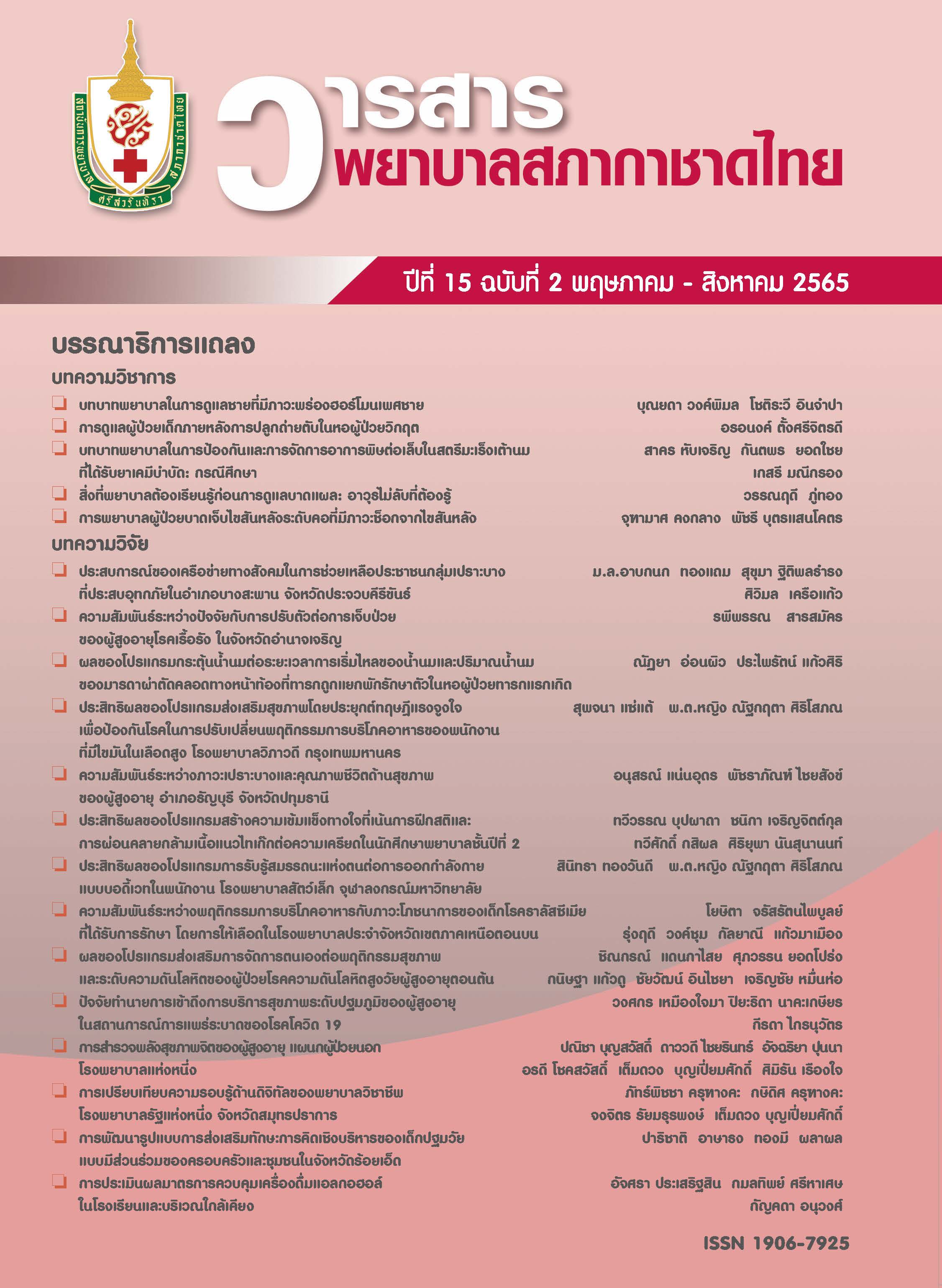Development Models to Promote Executive Functions of Early Childhood with Participation of Families and Communities in Roi Et Province.
Keywords:
early childhood, participation, executive functionsAbstract
This Participatory Action Research (PAR) aimed to develop and evaluate models to promote executive functions of early childhood with participation of families and communities in Roi Et Province. The participants consisted of 50 people who were in early childhood, parents, teachers, community leaders, public health officers and village health volunteers. They were selected by purposive sampling. The study was conducted by using self- efficacy and parent practices on the promotion of executive functions with early childhood questionnaires, knowledge tests, the MU-EF101 form for preschool-aged
children, participant observation, focus groups, and in-depth interviews. The quantitative data was analyzed by descriptive and paired t-test statistics. The qualitative data were analyzed by content analysis.
The results showed that 38.78 percent of the executive functions of early childhood were at the low level. Parent practices on the promotion of executive functions with early childhood were at the low level at 38.73 percent. The models to promote executive functions of early childhood with participation of families and communities consisted of six activities which were informed by participation of developing network partners. As a result, parents gained knowledge of self-efficacy and practices to promote executive functions with early childhood individuals Moreover, executive functions among early childhood were statistically significantly higher than before using the model (p < .05). Consequently, parents and network partners should provide continuous monitoring and promote executive functions of early childhood appropriately.
References
Diamond A. Want to optimize executive functions’ and academic outcomes?: Simple, just nourish the human spirit. In: Zelazo PD, Sera MD, editors. Minnesota symposia on child psychology: development cognitive control processes: mechanisms, implications and interventions. New Jersey: John Wiley & Sons; 2014. p.37.
Chutabhakdikul N, Thanasetkorn P, Lertawasdatrakul O.Tool development and evaluation criteria for assessment of executive function in early chaildhood. Bangkok: Molecular Genetics and Genetic Engineering, Mahidol University; 2017. (in Thai)
Imnamkhao S, Siripul P. Executive Function (EF) in early childhood: a concept analysis. NJPH 2020;30(3):10-22. (in Thai)
Leungratanamart L, Sudjainark S, Wattanaviroj N, Meelai W. Factors influencing the executive function in preschool-age children. NJPH 2021;31(3):15-27. (in Thai)
Seamkhumhom D, Nookong A, Rungamornrat S, Chutabhakdikul A. Factors related to executive functions in preschool-aged children. Journal of Thailand Nursing and Midwifery Council 2019;34(4):80-94. (in Thai)
Siripornpanich V, Kotchabhakdi N. Brain and child Development. In: Sutchritpongsa S, Roongpraiwan R, Hansakunachai T, Benjasuwantep B, Fuangfoo A, Chuthapisith J, Rojmahamontkol P, editors. Textbook of Child development and behavior: 4 vols. Bangkok: Beyond enterprise; 2018. p. 3-18.
Hawkey EJ, Tillman R, Luby JL, Barch DM. Preschool executive function predicts childhood resting- state function connectivity and attention-deficit/hyperactivity disorder and depression. Biol Psychiatry Cogn Neurosci Neuroimaging 2018;3(11): 927-36. doi: 10.1016/j.bpsc.2018.06.011.
Chonchaiya W. Executive function. In: Sutchritpongsa S, Roongpraiwan R, Hansakunachai T, Benjasuwantep B, Fuangfoo A, Chuthapisith J, Rojmahamontkol P, editors. Textbook of child development and behavior: 4 vols. Bangkok: Beyond enterprise; 2018. p. 19-41.
Harnmetee S. The Development of executive functions with reading. Bangkok: ID all Digital Print; 2017.
Harnmetee S. Executive function lift immunity and drug prevention. Bangkok: Rakluke book; 2015. p 47-66.
Arsarthong P. Factors influencing to executive functions of early childhood. Research report (Unpublished manuscript). Roi Et: Roi Et Rajabhat University; 2021. (in Thai)
Sukadaecha R. Child-rearing of Thai families: a systematic integrated literature reviews. Journal of Nursing Science & Health 2020;43(1):1-9. (in Thai)
Ponmark J, Thisara P, Weiangkham D, Duangpanya A. Development of a family participation model for promoting child development: a case study of Ban Sanpamuang child care center, Mueang district, Phayao province. J Royal Thai Army Nurses 2019;20(2):241-50. (in Thai)
Chaichanasang T, Posri A, Tangtumpitak T. The family participation in child development stimulation and promotion at child development center. Journal of Nursing Science & Health 2018;41(1):95-104. (in Thai)
Assalihee M, Bakoh N. Parent involvement in education on pre-school Muslim Children’s executive function skills development (EF) in Pattani Province. Journal of Information and Learning 2021;32(3):67-82. (in Thai)
Thisara P, Ponmark J, Seekhao P. Sinlapawit-thayathon B. Predictive factors of parental behaviors on promoting early childhood development in Phayao Province. Journal of Nursing and Health Care 2017;35(2):169-76. (in Thai)
Pumprawai A, Siengsanau J. Using community participation to improve health promoting behaviors among older adults. The Southern College Network Journal of Nursing and Public Health 2017;4(3):160-75. (in Thai)
Kemmis S, McTaggart R. The action research planner. 3rd ed. Australia: Deakin University Press;1988. p. 8-11.
Cheawjindakarn B. Qualitative case study research techniques. Liberal Arts Review 2018;13(25):103-18. (in Thai)
Ritpleak S. The development on model for the promotion of 1-3 year old child development through the participation of family and community: a case study of Tambon Banyang, Amphoe Meuang, Changwat Burirum. Research and Development Journal, Loei Rajabhat University 2016;11:99-109. (in Thai)
Naulkhum P. The development of model for promoting early child development at child care centers in Mae Hong Son province. Primary Health Care Division Journal 2017;12(1):36-42. (in Thai)
Niyomthai N, Siripitayakunkit A, Duangbubpha S. Effects of a motivation for self-care program on self-care and quality of life in persons with heart failure. Rama Nurs J 2020;26(3):290-309. (in Thai)
Mektrairat W, Kongkeaw P. The curriculum of parental development to enhance EF cognitive development of early childhood in child development centers of KrokpharNakhon Sawan. Journal of Graduate Studies in Northern Rajabhat Universities 2021;11(2):15-30. (in Thai)
Winyagoon P, Seree P, Thanasethakorn P. The effect of learning experience based on the EF Guideline to executive function skills in preschoolers: a case study of the child central preventorium for children. Thailand Journal of Health Promotion and Environmental Health 2021;44(2):66-82. (in Thai)
Downloads
Published
Issue
Section
License
Copyright (c) 2022 Srisavarindhira Thai Red Cross Institute of Nursing

This work is licensed under a Creative Commons Attribution-NonCommercial-NoDerivatives 4.0 International License.
เนื้อหาบทความหรือข้อคิดเห็นต่างๆ ในวารสารพยาบาลสภากาชาดไทยนี้ เป็นความคิดเห็นของผู้เขียนบทความ ไม่ใช่ความเห็นของกองบรรณาธิการ หรือสถาบันการพยาบาลศรีสวรินทิรา สภากาชาดไทย






